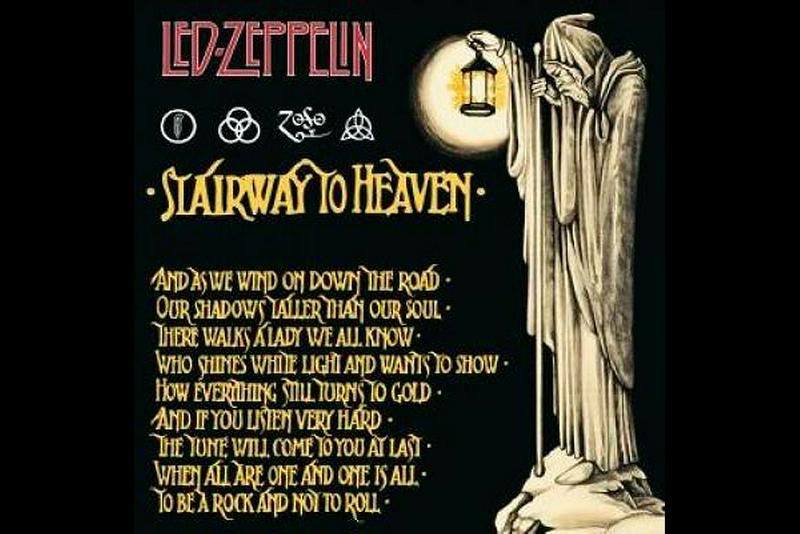The Story Of Led Zepplin's "Stairway To Heaven"
By | April 24, 2022

By many measures, Led Zeppelin's “Stairway To Heaven” ranks as the most famous rock song in history. However, the slow-building anthem never charted since it was never released to the public as a single. Despite that lack of recognition and its lengthy run time “Stairway To Heaven” quickly became the most played song in American radio history. It also routinely sells between 10,000 to 15,000 sheets of music annually, the most for any rock song.
Of course, anything that gains that level of popularity becomes subject to people’s crazy theories, like the notion that if you play it backward you’ll hear a message from the devil. Here are the many twists and turns of Led Zeppelin's iconic “Stairway to Heaven.”

A Much Anticipated Song
The band began planning “Stairway To Heaven” in the ‘70s as a replacement for their previous concert centerpiece “Dazed And Confused.” They titillated journalists with the tidbit that their next song could run 15 minutes long and that it promised to "build towards a climax."
Originally, the band stated that the genesis of the song began in a 250-year-old Welsh cottage called Bron-yr-Aur. However, many years later when the song came under copyright scrutiny, they admitted under oath that it was actually Headley Grange in Hampshire. Undoubtedly, the ancient Scottish cottage-inspired more mysticism than Headley Grange where sheep count among the biggest attractions.

Devilish Inspiration?
Wherever the song’s writing took place, Robert Plant remembered it coming in a flash, "I was holding a pencil and paper, and for some reason I was in a very bad mood. Then all of a sudden my hand was writing out the words, 'There's a lady who's sure all that glitters is gold/And she's buying a stairway to heaven.' I just sat there and looked at the words and then I almost leapt out of my seat."
Unfortunately, for Plant, that quote was grossly taken out of context and turned into a conspiracy theory that it was actually Satan who was guiding his hand. Purveoyers from their mother’s basements all over the world leaped at the connection between Jimmy Page buying occultist Aleister Crowley's house and Crowley’s advocation that his “followers” learn to read and speak backward. Those specious connections led to the theory that if you play “Stairway To Heaven” in reverse you’ll hear a message from the devil. Plant, for his part, was heartbroken by the discourse:
"'Stairway To Heaven' was written with every best intention, and as far as reversing tapes and putting messages on the end, that's not my idea of making music. It's really sad. The first time I heard it was early in the morning when I was living at home, and I heard it on a news program. I was absolutely drained all day. I walked around, and I couldn't actually believe, I couldn't take people seriously who could come up with sketches like that. There are a lot of people who are making money there, and if that's the way they need to do it, then do it without my lyrics. I cherish them far too much."

Mixed Reaction
Even though “Stairway To Heaven” became one of the all-time great rock songs, it did not debut to rave reviews. Lester Bangs called it "a thicket of misbegotten mush” and the British music mag Sounds said it engendered “first boredom and then catatonia."
The very first time the band played it on stage in Belfast Ireland, John Paul Jones said that the crowd was less than impressed and wanted to hear a "Whole Lotta Love." However, during a US tour Page remembered much better fanfare, “I'm not saying the whole audience gave us a standing ovation - but there was this sizable standing ovation there. And I thought, 'This is incredible because no one's heard this number yet. This is the first time hearing it!' It obviously touched them, so I knew there was something with that one."

Led Zeppelin Acrimony
Obviously, the tension between Page and Plant helped lead to the band breaking up. Perhaps the difference of opinion about the band’s most famous song also played into that. Page felt it was their masterpiece:
"To me, I thought 'Stairway' crystallized the essence of the band. It had everything there and showed the band at its best... as a band, as a unit. Not talking about solos or anything, it had everything there. We were careful never to release it as a single. It was a milestone for us. Every musician wants to do something of lasting quality, something which will hold up for a long time and I guess we did it with 'Stairway.'”
Plant at one point called it a “wedding song” while insisting that “Kashmir” was their pinnacle. Later in life, his stance somewhat softened but the bitterness remained:
“It belongs to a particular time. If I had been involved in the instrumentation I would feel that it's a magnificent piece of music that has its own character and personality. It even speeds up in a similar way to some pieces of more highbrow music. But my contribution was to write lyrics and to sing a song about fate and something very British, almost abstract, but coming out of the mind of a 23-year-old guy. It landed in the years of the era of 23-year-old guys. If you absolutely hated 'Stairway to Heaven,' no one can blame you for that because it was so pompous.”
